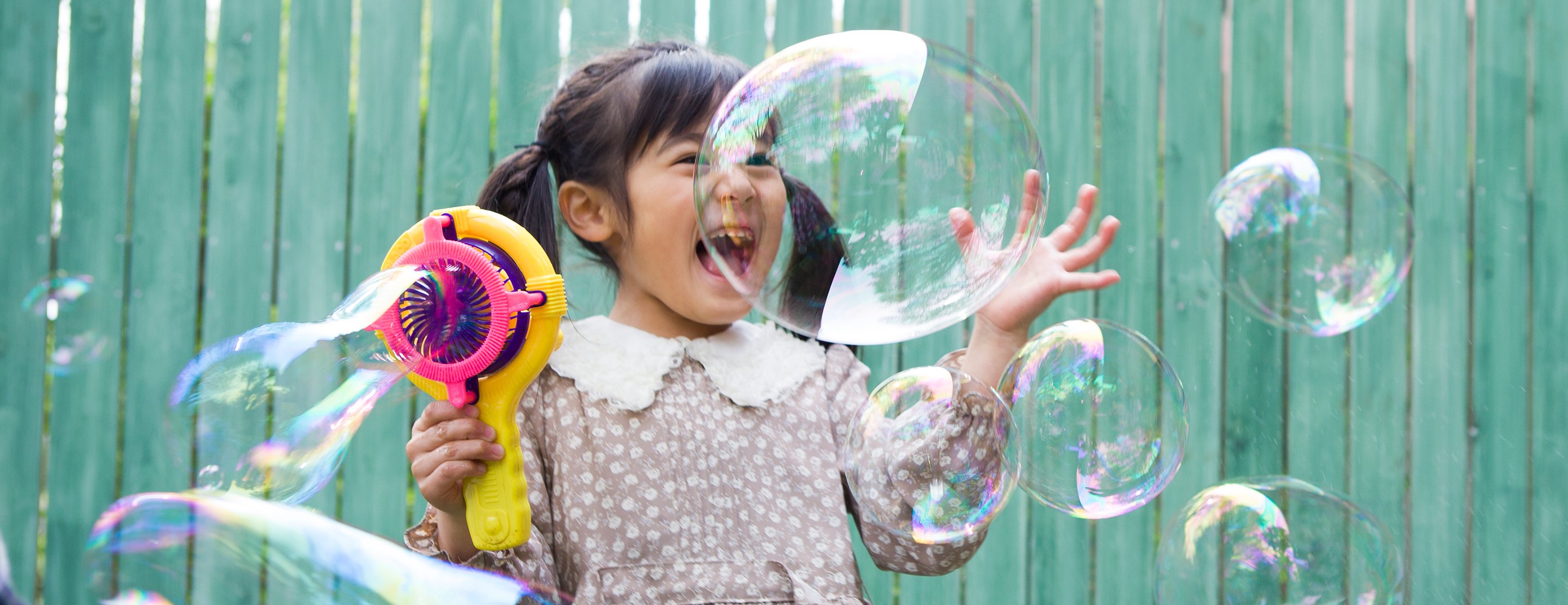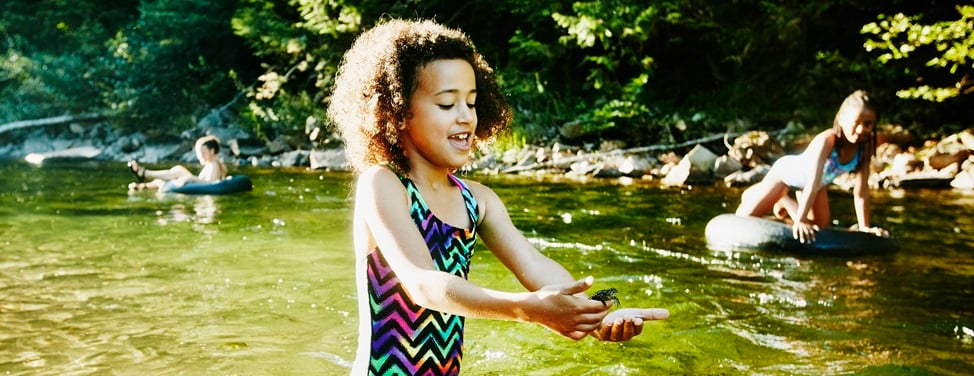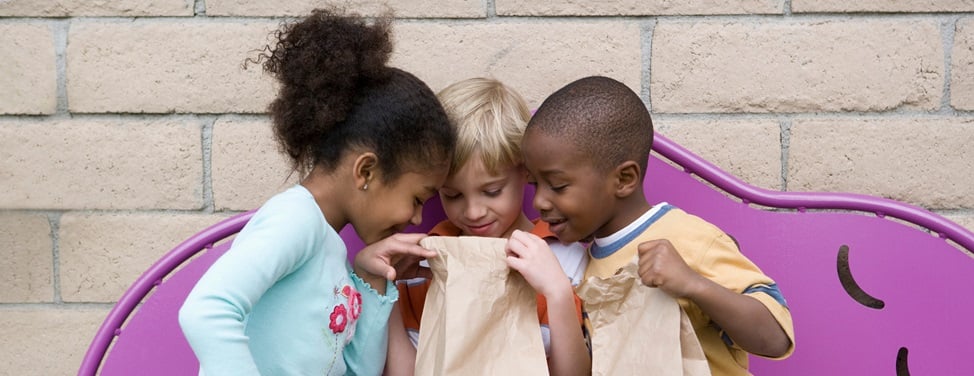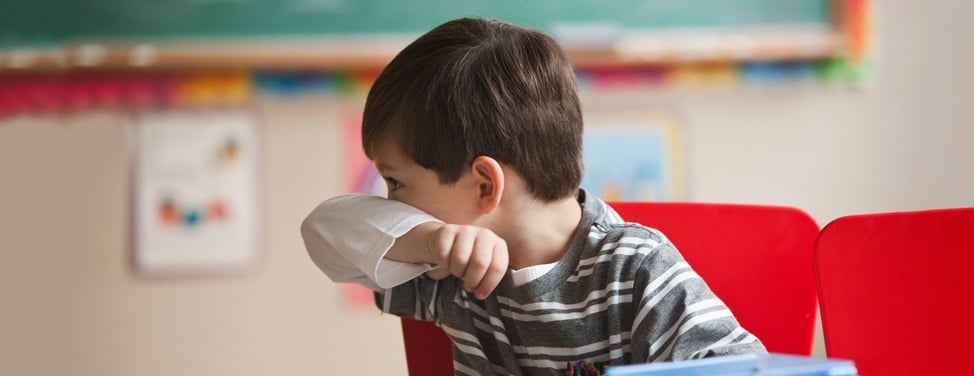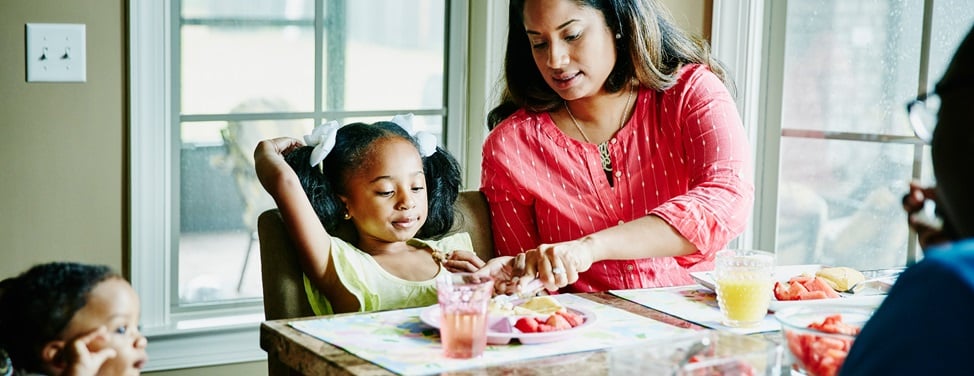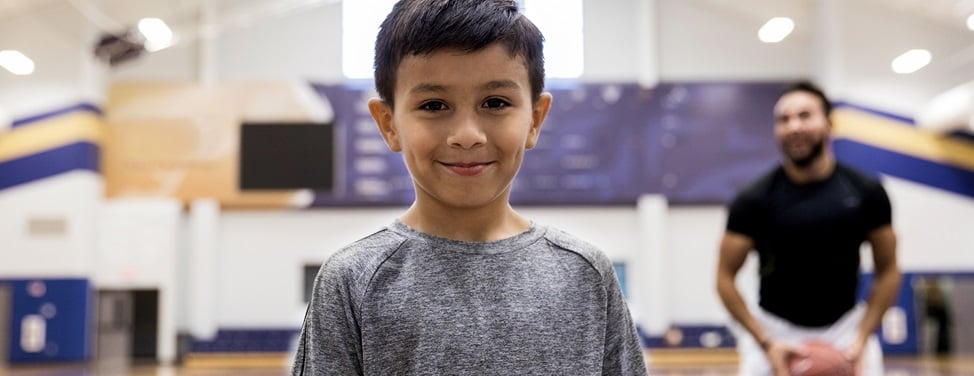As your child starts kindergarten, he or she will be exploring many new areas of life. Five-year-olds are eager and excited to learn about their world, their friends and their family. But they are also a little uncertain, as they try to learn new rules and master new ideas. You will enjoy your 5-year-old if you are aware of the developmental tasks he or she needs to learn.
Nutrition
Five-year-olds love routine and often want to eat the same thing for breakfast, lunch and dinner. You can encourage children to try other foods by taking advantage of their great imaginations. Decorate food by making faces on it, cut sandwiches into strips and call them trees or caterpillars, or make funny faces out of vegetable arrangements.
If your child sees you making healthy food choices and eating a variety of foods, he or she will eventually do the same. In the meantime, consider giving a once-daily children's multivitamin with minerals, to make sure your child is getting these nutrients.
Everyone in the family should limit fried foods, fatty foods and junk food. Since you control the shopping list, choose your groceries carefully. Do not buy sodas, chips, candies, cookies or cupcakes. Nutritious snacks for school lunches include fresh fruit, popcorn, pretzels, cheese and crackers, string cheese, raisins, nuts, carrot sticks, yogurt and dried fruit. Limit juice to 4 ounces a day.
Dental Care
Your child should have had several dental visits by now and should be in the habit of brushing and flossing at least twice a day. Children begin losing baby teeth between 5 and 6 years of age, usually beginning with the front lower teeth, or incisors. By this age, oral habits like pacifiers and thumb sucking should be discouraged. Please talk to your pediatrician or pediatric dentist if you have questions.
Toileting
Many 5-year-olds still have accidents at night and may wet their bed several times a week. Your child should gradually have fewer accidents as he or she grows and the nervous system matures. If your child has accidents during the day, either urine or stool, or starts having accidents after being totally dry for the past 6 months, please let your child's doctor know.
Sex Ed
Many 5-year-olds have been exposed to information about sexual activity and reproduction, and will talk openly about it at school. If you have not already started reading or talking to your child about the difference between boys and girls and some simple concepts of how babies are made, this is likely the right time to begin.
It's important to use the correct terms, such as labia and penis, to help your child feel comfortable talking about genitalia. It is also important to tell kids that their private parts — the parts that are covered by bathing suits or underwear — should never be touched by other people. Tell your child that secrets should be for happy things and surprises. Make clear that if someone asks your child to keep a secret that makes the child anxious or sad, he or she should not keep that kind of secret, and should tell a parent or trusted adult.
Safety
Five-year-olds are ready to learn many safety lessons:
- Look both ways before crossing the street.
- Don't open the house door without an adult present.
- Learn your full name, address and phone number.
- Know who to go to if you are lost or need help — for instance, people working at cash registers, people in uniforms and people with name badges.
- Learn bike safety rules, including always wearing a helmet.
- Learn the proper way to hold and use a knife and scissors.
- Learn how and when to dial 9-1-1.
Sports and Exercise
There are many organized sports activities available to children, such as swimming, dancing, soccer, Little League, gymnastics and martial arts. You may want your child to experience several different activities or just one. In either case, at this age, sports should emphasize playing together as a team and learning new skills. Be careful if too much emphasis is placed on winning.
Children today need more exercise than they get. Encourage playing outside in a safe area, rather than sitting inside and watching television. You will also benefit from playing and exercising with your child.
Be careful not to over-schedule your child. Children need some quiet, relaxing time to put together all the things they are learning. They also need time to read, daydream, build with blocks or color.
Chores
Doing work that is important and appreciated helps children feel needed and teaches that they are important members of the family. Make sure your 5-year-old has specific tasks that are important to the functioning of the family. Making his or her bed, setting and clearing the table, feeding pets, putting away toys — these are all ways your child can help out and develop good self-esteem from a job well done.
Allowance
This is probably a good time to begin thinking about a weekly allowance or a way for your child to have access to money. Most children learn about money in kindergarten or first grade, as they are taught how many pennies are in a nickel, how many nickels in a dime, and so on.
Some families choose to give their young children a small allowance without tying it to chores, feeling it is important for children to know that everyone in the family benefits from the parents' employment. Others believe that children should learn they earn money by doing work, and give an allowance after chores are completed. In either case, it is helpful to show children how to use money — how to put some money aside for saving, how to count the pennies, nickels and dimes, and how to pay for small items at the store.
Traditions
Children thrive in families that have traditions. Think of some traditions from your own family or new traditions to begin. Celebrating half-birthdays with a cupcake, taking walks after dinner, reading a story before bedtime, waking the birthday child early in the morning with a funny song, writing notes for lunch boxes — traditions do not need to be elaborate or cost a lot of money.
Family Dinners
One of the best traditions a family can share is to eat meals together as much as possible. Dinner is especially important, and we encourage families to spend it together. This allows time for the family to regroup and share the day's events with each other. You can use dinnertime for fun, sharing jokes — which 5-year-olds are just beginning to enjoy — talking about feelings and emotions, or experiences and how the family members handled them.
Try to make dinner a relaxing occasion, not a time for discipline. Turn off the television to encourage everyone to talk.
Lying
Five-year-olds are trying to learn the difference between what is real and what is pretend. They enjoy stories like Amelia Bedlia and Paul Bunyon as they learn to determine what is true and what is not. You can help them by using new words like "fantasy," "fact," "fiction" and "truth." Point out when something your child sees is not real — such as cartoons — and things that are real, such as the car, bus or truck on the street.
Expect your 5-year-old to tell lies. When your child tells you something you know is untrue, ask if it is fact or fiction. Then ask your child to tell you again in a different way. Don't label your child a liar — he or she is still learning.
Stealing
Kids this age are also trying to learn what it means to own something. Many schools have a time for sharing, when children bring special items from home to show the other children. Since children may interpret "sharing" as meaning they can take or use the toy, expect toys to appear in your home that don't belong to your child.
If this happens, or if you find candy from the store in your child's pocket, do not label your child a thief. Explain calmly that the items belong to someone else and must be returned. Then go with your child and help him or her return the item. Your child will be grateful for your support and for your example of how to correct a mistake.
Pets
Consider choosing a small pet for your home if you don't already have one. Children learn many things by having a pet — responsibility, caring, empathy, and often about death and birth.
Small pets that are good for younger children include goldfish, guinea pigs and lop-eared rabbits. Hamsters are nocturnal and are often sleeping when children want to play. Mice and rats have a short life span, so if you choose one as a pet, be prepared to help your child experience the death of a pet. Turtles and salamanders can carry an infection that is dangerous for children, so please don't keep these animals as pets.
If you already have a dog or cat, allow your child to assume more responsibility for the pet's care.
Television, Computers and Video Games
Five-year-olds will learn a lot from television, videos and computer games. Much of what they learn is not helpful. They may see violent acts that are not punished. They will often see sexual experiences that are inappropriate for their age. And they will spend time sitting when they should be exercising, reading, exploring, creating or just daydreaming.
Children who watch more than one hour of television a day are more aggressive and less creative. They read less and do not do as well in school. They also have a tendency to become overweight because they're not active. You can benefit your child and your whole family by turning off your TV and limiting all "screen time" (TV, computer and video games) to one hour a day. Whenever possible, be present when your child is watching television and choose programs together.
Fears
Children have different fears at different ages. Many 5-year-olds develop fears of death and of being separated from their parents. Your child may begin asking questions about death. This is an important time for parents to consider their own beliefs so they can provide consistent answers to their children.
Discipline
By this age, your child should know how to listen and obey you without arguing or questioning. If your child is having trouble obeying you, he or she will have difficulty following the teacher's instructions. There are many useful discipline teaching tools you can use at this age:
- Time out:Time out allows children to think about what they've done wrong and how to change their behavior. You can allow your 5-year-old to stay in time out until he or she is ready to behave appropriately. After time out, make sure to tell your child that you love him or her, and that it was the behavior that you didn't like.
- Natural consequences: When you allow your 5-year-old to go hungry at lunchtime because he or she forgot to take lunch to school, that is a natural consequence of forgetfulness. Of course, this tool should not be used when the child's safety is involved.
- Rewards: Children love to earn rewards by doing a job well. This helps foster self-esteem and teaches that good behavior is rewarded. There are many ways to set up a reward system, such as sticker charts or pennies in a jar.
- If this, then this: "If this...then this" is a great way to teach a child that actions and behaviors have consequences. For instance, "If you get ready for school quickly, we'll have time to read a story together before we leave."
Social Interactions
Children entering kindergarten usually get their first opportunity to participate by themselves in activities such as another child's birthday party, sleepover or sports practice. Now is the time to begin paying attention to your child's friends. Who does your child like to play with? What do the children enjoy doing together? What books do they like to read?
Take the time to meet the parents of your child's friends. Do they share your values? Many parents have been shocked to discover, long after the fact, that their children were exposed to domestic violence or pornography during an overnight at a friend's house.
Remember that you are your child's only advocate. Only you can decide what's right for your child. Being "overly protective" of your child may make you feel uncomfortable and awkward with other adults, but may be the best way to spare your child frightening or dangerous experiences.
Development
Elementary-age children have many tasks to master as they prepare for life. Your 5-year-old is beginning to learn how to solve problems, make decisions and take responsibility. Here are some of the developmental tasks your child will be tackling:
- Develop and maintain self-esteem, usually by accomplishing a difficult task
- Find social acceptance through opportunities to play with friends
- Discover and copy role models; parents are the child's most important role models
- Learn values, begin to question differences between the family's values and the values of others
- Feel accepted at home and assured that they are an important part of their family
- Acquire new knowledge and skills
- Learn to handle fears
- Lear to handle desires
As your child goes through each day, he or she will be learning in all of these areas. Take time to think about what your child is learning and how you can encourage his or her development.




























